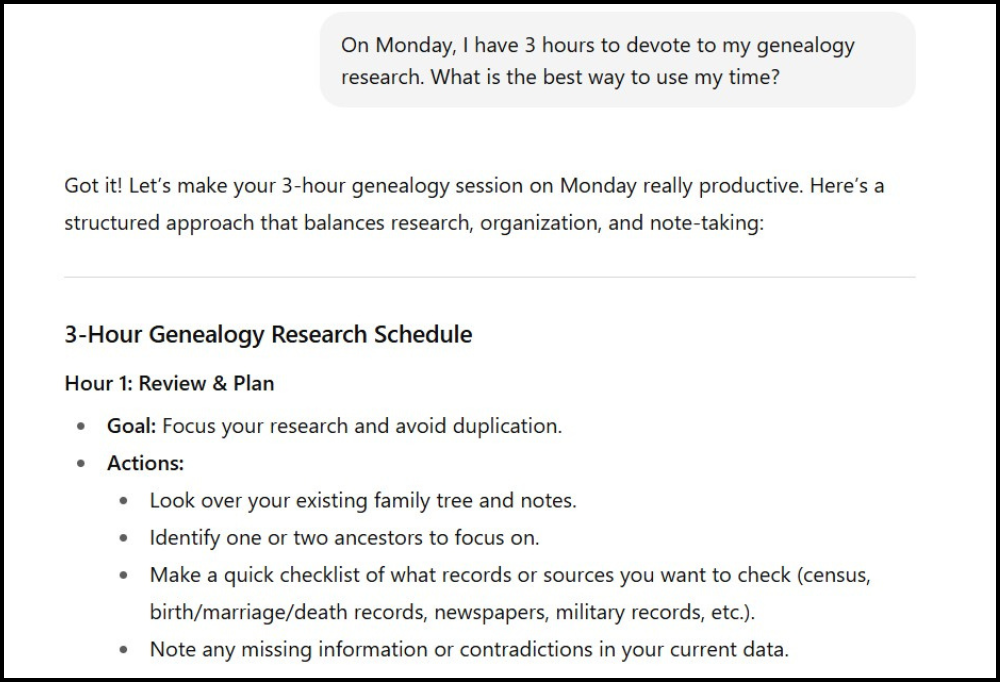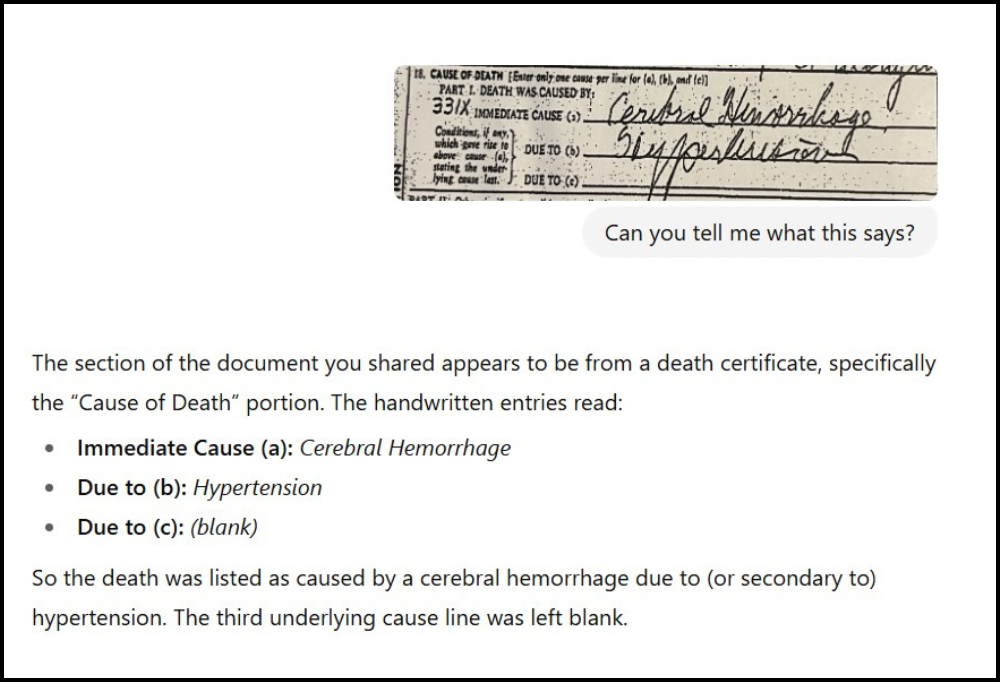Have you ever sat at your desk, staring at a census record, and thought, “I have no idea what I’m looking at”? I’ve been there more times than I can count. Genealogy is full of exciting discoveries, but let’s be honest—it can feel so frustrating and overwhelming.
That’s where ChatGPT can come in handy. You’ve probably heard people talking about it—this AI tool that can “write anything” or “answer any question.” A lot of businesses already use it for composing emails and document, but what about using it for genealogy? Can it really help us dig into family history?
The short answer is: yes, but with limits. Think of ChatGPT like a helpful assistant—it can organize your thoughts, suggest ideas, and even turn your notes into something readable. But it’s not a magic genealogy genie. There are things it can and cannot do.
Using ChatGPT to Create a Research Schedule

One of the hardest parts of genealogy isn’t finding records—it’s finding time. Between work, my family, and just everyday life, it’s easy to let research slide to the bottom of my to-do list. That’s where ChatGPT can give you a boost to get things done.
You can actually ask ChatGPT to help you create a research schedule that fits your life. For example, I told it:
“I have two hours on Tuesdays and one hour on Saturdays for genealogy. Can you make me a schedule that balances online research, organizing notes, and writing family stories?”
And you know what? It gave me a breakdown that looked something like this:
- Tuesday (2 hours): Spend the first hour searching records on Ancestry or FamilySearch. Use the second hour to review and organize notes.
- Saturday (1 hour): Focus on storytelling—draft a short family bio or organize photos.
It’s not a perfect solution, but it did give me an idea of how to fit everything into my schedule through fresh eyes. You can also tweak the plan so it feels more realistic for your own lifestyle and time schedule.
Another trick I like is asking ChatGPT to prioritize research tasks. For example:
“I want to learn more about my great-grandfather who lived in Charleston, SC, in the 1920s. What should I research first?”
It will often suggest starting with census records, city directories, and newspapers, then moving on to military or marriage records. Having that checklist laid out in front of me helps me stay on task and keeps me feeling less scattered.
So, if you’re the kind of person who feels overwhelmed by all the “to-dos” in genealogy, try letting ChatGPT help you map out a schedule. Sometimes just seeing a plan in front of you makes all the difference.
What ChatGPT Can Actually Do

Here are a few ways I’ve used it in my own research (and maybe they’ll help you too):
- Untangling tricky records. I copied a messy will transcription into ChatGPT and asked it to explain the gist. It didn’t replace my own reading, but it helped me see things more clearly.
- Brainstorming next steps. When I wasn’t sure what records might exist for an ancestor in South Carolina in the 1870s, ChatGPT gave me a list of possibilities I hadn’t thought of.
- Turning facts into family stories. Dates and places are important, but they’re not always exciting to share. I fed ChatGPT the basic info, and it drafted a little narrative I could edit for my family.
- Making sense of timelines. Sometimes I’ll drop in a bunch of life events and ask it to put them in order—it helps me see patterns I might’ve missed. You can also asked what life events such as war or illness that may have taken place during that time line.
What ChatGPT Can’t Do (And Why That Matters)
Now, let’s get real about the limits. ChatGPT:
- ❌ Can’t pull records from Ancestry, FamilySearch, or any subscription site.
- ❌ Doesn’t fact-check you. If you give it wrong info, it will run with it like it’s true.
- ❌ Can’t replace your gut instincts or your detective work.
Though if asked, ChatGPT will fact check information for you, if you put in the wrong information, it will automatically assume it to be true and place that information in your summary. That means you still need to double-check everything yourself. ChatGPT is a helper, not a historian. It does have it’s limits.
A Few Tips if You Want to Try It

- Be clear and specific. Instead of “Tell me about John Smith,” ask, “What records might show where John Smith lived in the 1850s?”
- Use it for writing help. If you struggle putting family stories into words, let ChatGPT have a try—you can always edit it to make it your own. If it sounds too “computer generated”, ask it to humanize the summary.
- Keep sources front and center. ChatGPT can’t cite things for you, so keep track of where you got your info.
10 Ways ChatGPT Can Be Used for Genealogy Research
- Create a research plan: Generate a step-by-step schedule for tracing ancestors, including which records to search first.
- Brainstorm questions for relatives: Suggest specific, insightful questions to ask family members to uncover hidden details.
- Transcribe and interpret documents: Help decode old handwriting, abbreviations, or confusing record formats.
- Summarize large records: Condense long census, birth, marriage, or death records into key details.
- Suggest sources and archives: Recommend online databases, libraries, or local archives for particular surnames or regions.
- Organize family trees: Offer tips for structuring trees, creating charts, and linking data efficiently.
- Identify research gaps: Analyze your current data and point out missing generations or events.
- Generate ancestor timelines: Build chronological overviews of a person’s life based on collected records.
- Assist with historical context: Explain the social, economic, and migration trends that affected your ancestors.
- Draft outreach messages: Write polite, professional messages for contacting distant relatives or archive staff.
Final Thoughts
Here’s how I think of it: genealogy will always be about patience, digging into records, and double-checking the details. ChatGPT doesn’t change that. But it can make the process a little less overwhelming.
I like to think of it as a brainstorming buddy—it helps me get unstuck, organizes my scattered notes, and sometimes even gives me a fresh perspective on old records. But at the end of the day, you and I are still the researchers.
So, have you tried using ChatGPT for genealogy yet?
The Legal Stuff
Please keep in mind that when you click our links and make purchases, we may receive a small commissions. This does not impact our reviews and comparisons as I try my best to keep things fair and balanced, in order to help you make the best choice for you.

